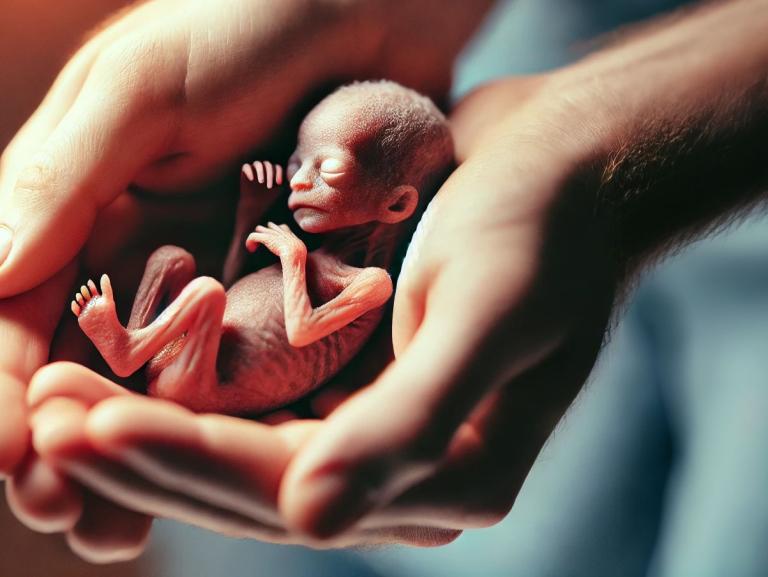Are unborn children without sin? The answer to this question has a lot of implications for the many faceted abortion issue.

Dear Thoughtful Pastor: Can you help me with the theological underpinnings of this? Do religious folks who object to abortion believe that unborn children are without sin? I thought Christians believed that all humans are conceived and born into sin. If not, why baptize infants?
Wow–that’s a question I have not thought about before. And one worth asking.
The idea that all humans are born irredeemably marked by sin comes from Psalm 51:5, “Indeed, I was born guilty, a sinner when my mother conceived me.” This is part of a great song of sorrow and repentance written by David, King of Israel, after his affair with Bathsheba and his subsequent murder of Uriah, Bathsheba’s husband.
David arranged for the murder so that he could bring the then pregnant Bathsheba into the royal household as one of his wives. His heart broke when he faced what he had done. This particular and exquisitely beautiful psalm offers an honest acknowledgement of wrongdoing, a pleading for mercy, and the hope of restoration.
With its beauty, it also opened a Pandora’s box of questions about the sinfulness of sex, the eternal fate of infants and the unborn children. The verse can be translated “In sin my mother conceived me,” leading some theologians, the influential Augustine among them, to declare that the very act of sexual intercourse is by its nature sinful.
As I said, Pandora’s box.
But to get to the question, only some Christian traditions baptise infants. In those traditions, It is done so to mark their membership in the household of God. As the liturgy says, “Through the Sacrament of Baptism we are initiated into Christ’s holy Church. We are incorporated into God’s mighty acts of salvation and given new birth through water and the Spirit. All this is God’s gift, offered to us without price.”
When an infant is baptized, the child’s parents and sponsors make promises on the child’s behalf. The larger church community also pledges to surround the child and help rear them in the faith. When the child grows older, usually somewhere in the teen years, they are expected to confirm the decision made by their parents and guardians by a public acknowledgement of their own willingness to step more fully into the life of faith.
The baptism itself is not seen as a saving act, but as a way to acknowledge God’s loving and merciful gift of redemption to humankind.
Other traditions will not baptize until something generally called the “age of accountability” has been reached. Somewhere between early childhood and late teens, depending on the particular branch of Christianity, a person is expected to gain awareness of their sin nature and their total inability to live righteously. At this point, they declare faith in Jesus and receive a baptism of repentance, thus marking their actual entrance into Christianity.
So, some traditions say, “there is no danger of hellfire until the child has reached the age of accountability” whenever that might be. Other traditions say, “Let us baptize as early as possible to mark that child as a member of the household of God.”
Both traditions want to show mercy as both recognize the essential innocence of infants.
Now, in the midst of these muddy waters, let us turn to abortion and your question: are unborn children without sin? Again, think “innocence” here. The unborn are innocent BUT . . . , in some Christian theological worlds, they are also considered totally depraved, that is, the sin nature is inherent in their beings. There is no possibility of hope for goodness or eternity with God until and unless God chooses them. They may be innocent but will inevitably act out their innate depravity.
Assuming that life does begin at conception, we now have to ask: “Does God send aborted fetuses marked with that indelible sin nature to hell without some sort of human intervention, such as a non-viable fetus baptism?”
How about another Pandora’s box here? At least 20% of all pregnancies, and probably many more, end in miscarriage, i.e., the death and expulsion of the fetus from the womb. Many pregnancies are naturally terminated even before the woman knows she is pregnant. She may not even know that her womb is expelling an unviable fetus.
Are those products of conception destined for eternal punishment? That’s a pretty repugnant idea to most people.
As you can see, there are some real problems here, no matter which side your religious tradition lands on.
In the end, I don’t think those who oppose abortion have the sinfulness or the non-sinfulness of the unborn in mind. Nonetheless, it is good to think about. Assuming life begins at conception, that is, the embodiment of an eternal soul takes place within even the first cell division of the fertilised egg, then I suspect we all hope for the mercy of God to take pity on the innocents. The alternative is just too horrific to contemplate.


















